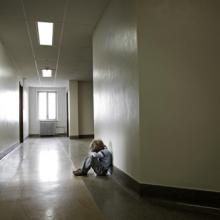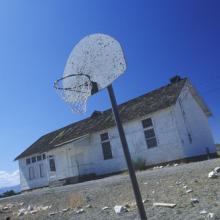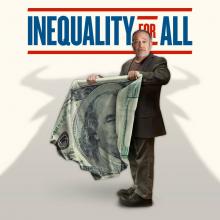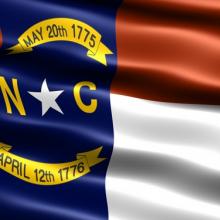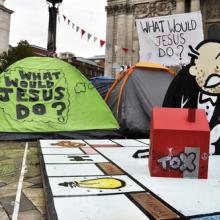economic inequality
This week, there was a lot of commentary about the State of the Union, the title of the president’s annual January speech before a joint session of Congress. I thought it was one of Obama’s best addresses recently because he focused on what is real for this country — growing economic inequality where only a few are doing “spectacularly well” while many families are still struggling just to get by.
The wife and mother from one of those families wrote the president a letter that seemed to have moved him, so he lifted up her “tight-knit family” trying to get through “hard times,” as she sat up in the gallery next to first lady Michelle Obama. Her family became a parable for the nation that is starting to do better economically but still faces hard choices that the president sought to address with very practical suggestions to support what he called “middle class economics."
Obama’s proposals for shifting tax breaks from the very wealthy to the middle class, to make possible child tax credits, days for sick leave, assistance with child care, and some relief from expensive educational costs are all proposals not likely to be supported by the new Republican Congress. But the speech begins to set what could be a long-term agenda to deal with our massive economic inequality — finally. Even the Republicans now might have to face up to the increasingly visible, embarrassing, alarming, and morally indefensible gaps between a small elite and the rest of the country.
Last week I spent a few days in Rome with, among others, Tony Jones. As someone who hasn’t ever been to Rome, it was particularly helpful for me to have a Christian historian along. It’s easy enough, having seen one amazing display of ruins after another, or cathedral after awesome cathedral, to lose some perspective. So along the way, Tony would stop and point out the historic significance of various landmarks. Then of course, we’d go grab a bourbon and talk.
Both of us, at one point or another in the week, thought of the Monty Python scene from Life of Brian, in which the disgruntled rebels exclaim, “What have the Romans ever done for us?” So of course, some wise guy in the group starts rattling things off, like the aqueducts, roads, education, and so on.
So this led to a minor debate between Tony and me about the benefits of empire. Now, keep in mind that Tony is never one to pass up an opportunity to serve as the antagonist, but his argument as outlined in his blog post cheekily titled “In Praise of Empires,” is that it’s en vogue to trash empire, both present and past.
To put a finer point on it, we chatted about whether Constantine, the Roman emperor responsible for establishing the Nicene Creed, was an ass-hat.
Protests in Ferguson, rallies in Hong Kong, and the Occupy Movement: People challenging systems and structures clamber for my attention. But faithful followers of Jesus shouldn’t get involved in these political and economic wrangling, should they? Sure, we ought to pay our taxes and vote; you know, give to Caesar and all that. But Christians should only be concerned about the spiritual transformation of individuals, not gallivanting around to rail against political and economic systems. After all, Jesus never protested political or economic policies did he? If we transform enough people, won’t the rest of the systemic issues work themselves out?
I have heard this challenge to Christian involvement in social movements numerous times, and it holds a certain appeal for someone like me who is allergic to politics. I’m the no-bumper-sticker, no-yard-sign guy who would just as soon steer a discussion away from upcoming elections than face the discussion of large-scale political or economic issues. I’d much rather focus on individual spirituality. After all, Jesus never did march on Rome or speak out against Caesar’s cruel dictatorship. He doesn’t mean for us to get mixed up in social, political or economic activism.
Or does he? I am learning to re-examine the cultural lenses by which I encounter Christ in scriptures.
In the past few months, the world has witnessed the worst outbreak of Ebola since the disease was first identified in 1976 — it has already claimed the lives of more than 3,400 people. But while the first cases in the U.S. and Spain have stirred fears over the past week, we don’t need to fear an unstoppable epidemic in developed countries. As World Bank President Jim Yong Kim aptly put it in a piece for the Huffington Post:
The knowledge and infrastructure to treat the sick and contain the virus exists in high- and middle-income counties. However, over many years, we have failed to make these things accessible to low-income people in Guinea, Liberia, and Sierra Leone. So now thousands of people in these countries are dying because, in the lottery of birth, they were born in the wrong place.
Dr. Kim makes the crucial point here — the current Ebola outbreak is much more than a public health crisis — it is an inequality crisis.
In a township called Khayelitsha, a woman wakes well before dawn to catch a bus that will carry her to the beautiful home in Cape Town where her employer/boss/master wants his tea in bed by 7 a.m. That is what “post-apartheid” South Africa still looks like today.
I just returned from a remarkable month in South Africa—the country that changed my life. I’ve often said that I learned my theology of hope from South Africa, during the anti-apartheid struggle I was thrust into as a young man. South African church leaders invited me in years ago. I got to see and experience the costly movement for freedom in the 1980s, witness the miracle of the inauguration of Nelson Mandela’s rainbow nation in 1994, and later join a wonderful reunion of South African activists, many of whom had been in exile or in prison, along with some of us international allies. So when I set out on a South African speaking and book tour 20 years after the new democracy, I didn’t know what to expect.
This time, I brought my family so they could see the country that had meant so much to me. What I discovered was a new generation of South African leaders ready to define their own vocation and mission as they help build a new nation. I quickly came to understand that making a deep connection with them was the real reason that I had come back. It’s tough to be in the shadow of a heroic generation of leaders like Desmond Tutu whose agenda has been the political liberation of South Africa—accomplished to the amazement of the world. On this trip, 20 years later, I saw the incredible freedom of movement now for all the former racial categories—but also how the systemic geography of apartheid was still painfully evident.
Economic inequality in South Africa is now greater than it was even during the days of apartheid, and gender violence is rampant. So these are the new agendas of a new generation: economic liberation and gender equality, with a commitment to lead on both in the churches. The rainbow of young people who turned up in such great numbers at all of our events truly want a new South Africa— a society yet to emerge.
The interesting thing about human nature is that even among the oppressed, people will seek supremacy, a pecking order. We human beings have great capacity for tenderness and compassion, and we’re also the meanest things in the world! And even when we are oppressed together, we will try to find some advantage or superiority over others.
“As for you, my flock, saith the Lord, I shall judge between sheep and sheep, between rams and goats. Is it not enough for you to feed on the good pasture, but you must tread down with your feet the rest of your pasture?”
In other words: Do you have to get what’s yours and at the same time mess it up for others?
I have a vivid memory of my first visit to Sing Sing Correctional Facility in upstate New York. Some young inmates were reading my book, The Soul of Politics, as part of a seminary program in the infamous prison, and they invited me to come discuss it with them. The warden gave me and about 50 young men several hours together, and I will never forget the comment one of them made: “Jim, most of us here are from just five or six neighborhoods in New York City. It’s like a train that starts in my neighborhood, and you get on when you are 9 or 10 years old. The train ends up here at Sing Sing.” But then he said, “Some of us have been converted, and when we get out, we’re going to go back and stop that train.”
That’s exactly what President Obama’s launch of “My Brother’s Keeper” is calling us to do: to stop the train that is taking young men of color from broken economies, schools, families, and lives into despair, anger, disengagement, trouble, violence, crime, prison, and even death at an early age. This is an urgent and long-overdue moral call that must supersede all our political differences.
While the president’s agenda has always included goals intended to help all Americans, this launch was painfully, powerfully, and prophetically specific.
Last week marked the fourth anniversary of the landmark Supreme Court case Citizens United v. Federal Election Commission. In a 5-4 ruling, the court ruled that corporations are entitled to the same free speech rights as individual humans as guaranteed under the First Amendment.
The political repercussions of Citizens United include the rise of “Super PACs” — political action committees that can raise and spend unlimited amounts of money, independent of direct campaign contributions, to influence politics. The power yielded to such corporations, as well as indiscriminate spending allowance, has deleterious effects upon our democracy.
Because money talks, big money will talk a lot louder, drowning out the voices of average Americans trying to exercise their own civic rights. Politicians are undoubtedly more apt to respond to the requests of companies that shelled out hundreds of millions of dollars on supportive campaign politics than to the needs of a college graduate or working family who donated 10 bucks. Doesn’t exactly smack of sound democratic governance.
Despite all the modern conveniences of the 21st century, our information-saturated culture, an exhaustive supply of self-help books, and giant advances in medical technology, doesn’t it seem like our society is more stressed, our anxiety higher, and more of our kids prescribed behavior modification drugs?
What if one of the reasons for our strung-out culture was the social, emotional, mental, and physiological outworking of the effects of poverty?
In the latest release of the Shriver Report, Dr. Nadine Burke Harris, founder of the California Pacific Medical Center’s Bayview Child Health Center, has found through medical research and experiences of her patients that the stress of poverty can be manifested in alarming behaviors and predispositions.
(Spoiler—and imperfect analogy — alert to anyone who wasn’t able to sneak these books when they were pre-teens)
If there was one book series that defined my childhood/pre-adolescence, it would be V.C. Andrews’ Flowers in the Attic series. OK, maybe that wasn’t THE book series—after all, there were the Baby-sitters Club books and Sweet Valley High—but in terms of helping to destroy what little innocence I still had, Flowers in the Attic gets top ranking. I mean, I probably didn’t need to be reading books about incest, child abuse, and religious fanaticism when I was 10 years old. But that’s a story for another time.
The Lifetime network has made a film version of Flowers in the Attic that will debut on Saturday night. In anticipation of the remake, I decided to watch the 1987 version starring Kristy Swanson. Besides being struck by how dated it was — think fuzzy lighting, a lot of beiges and pastels, and 80s bangs — the premise seemed outdated even for that time. A recently widowed stay-at-home mother of four finds herself unable to care for her family and must return to her wealthy, estranged parents and beg to get back into her dying father’s good graces (and will). As a condition of her return, she must consent to have her four children locked in the attic and subjected to her mother’s abuse and neglect.
I sometimes forget how much the world has changed in such a short period of time.
It’s one thing to say kind words about gay people and atheists while admonishing those who would bury them in stones.
It’s one thing to walk humbly and call the Catholic Church to compassion for the poor.
It’s one thing to kiss a horribly disfigured man from whom most people would run in disgust.
But apparently, it’s quite another to start calling out growing economic inequality and naive faith in capitalism. By doing just that in his recent encyclical, Pope Francis has touched a third rail in conservative American politics. So begins the backlash.
Yet in the new round of skirmishing around Francis and his supposedly “liberal” views, U.S. political pundits and news media wags — both progressive and conservative — are missing the point about the pope and what he’s up to. Their mistake? They see his words and deeds through the lens of American politics and ideology. What Francis is doing is prophetic, not political, and we should recognize that he’s playing, to his credit, in a whole different arena.
Most Americans share a common understanding that many public schools in poor neighborhoods aren’t great. It’s rare that I engage anyone who doesn’t know this basic fact on some level. But what’s less common is a deeper understanding of the extent of the problem. And sadly, even less common than that? Finding individuals who express a deep conviction that educational inequity can be eliminated. Faith communities are poised to add our voices to this much-needed conversation.
Fifteen million children live in poverty in the United States. Given poverty’s impact, many of these children already face additional challenges in their lives. For many young people, education can be “the great equalizer.” A high quality school can provide students with the necessary foundation to go to college and have a variety of opportunities opened to them. Poverty can become a thing of the past. But students growing up in poverty are more likely to attend low-performing public schools. In fact, only 22 percent of children who have lived in poverty do not graduate from high school. Only 9 percent receive college diplomas. And, not surprisingly, given our nation’s historical intersection of racial injustice and poverty, African American, Latino, and Native American students experience some of the nation’s biggest educational inequities.
Robert Reich pulls up in his silver Mini Cooper, quipping that he and his car are in proportion to each other. Reich, former Secretary of Labor in the Clinton administration, identifies himself with the underdog, the little man.
His new movie, Inequality for All, looks into the effects of wealth inequality in the United States. Throughout this semi-autobiographical documentary, Reich consistently leans on his self-deprecating sense of humor by poking fun at his own physical stature; he’s 4’10 ½’’ tall. The jokes, however, do lead back to the heavier issue at hand – the American worker is getting squeezed out of the middle class.
We worry now, but we’ve been concerned about the economy for a long time. The economic recovery from the recession in America has been slower than we hoped, and people continue to suffer from the collapse of so many industries and jobs and safety nets. Much of the pain seems new for large swaths of the American population. But in reality, we’ve been worrying about money forever.
The August employment report from the Bureau of Labor Statistics shows a slight decline in the unemployment rate (down to 7.3 percent from 7.4 percent in July), according to Businessweek. But the drop is largely attributed to a reduction in the workforce of about 300,000. What’s more, the participation rate (number of people working or looking for work compared to the total working age population) fell from 63.4 percent to 63.2 percent, the lowest since 1978. The National Employment Law Project noted that much of the job growth in August was in retail and food service, industries that generally offer lower paying and part-time jobs.
Even though a growing number of economists see modest and encouraging signs in the recession recovery, the slow growth continues to cause trouble for many Americans. Businessweek writer, Matthew Philips, even questioned whether the economy might be “stuck in second gear” without hope of a more robust “third gear” to propel the recovery forward.
The economic health of the nation has long been a concern to people of faith, because we care for the poor, and poverty has been a persistent problem in rural area and urban centers alike. What’s more, we know there are people of all income levels who struggle with money and possessions, and we are concerned about this, too. We worry that people have enough to eat and that wealth not corrupt our best desires and intentions.
It’s true that by some standards I am not North Carolinian, nor or am I Southern. I was not born there — I have no extended family there. I don’t speak with a drawl. And I don’t (gasp!) like sweet tea or Cheerwine.
But after 14 birthdays, nine years in the public education system, four years at UNC-Chapel Hill, countless pounds of barbecue, numerous trips to the Appalachians and the Outer Banks, and many lifetime milestones — including voting for the first time! — passed in that beautiful state, it is now the closest thing to home I know.
Once we have decided to follow Jesus, we cannot help but live out our personal beliefs in public ways. The demands of the Gospel refuse us the option of a purely inward spirituality.
While there are times when those in power listen to the guidance of moral and religious leaders, far too often we’re asked to be prophets. In the face of opposition, we pick up our crosses and lift up our voices on behalf of the disadvantaged.
In North Carolina, pastors and civil rights leaders, along with thousands of others, have been living out their personal faith in a very public way. Since late April, dozens of faith leaders and hundreds of others have been arrested at the state capitol as part of an ongoing protest call “Moral Mondays.” What would motivate these leaders to take such a strong stand at such a personal cost?
Brazil and the World Cup are in the news now, but not in the way that pleases the Brazilian government. Crowds are gathering in the streets around football (soccer) stadiums where Confederation Cup games are being played but not to buy tickets or get autographs of their sports idols. They are congregating to protest against the 2014 World Cup coming to Brazil. Brazilians protesting football? Upset about hosting the World Cup? Something has gone seriously wrong. This is like the French boycotting wine or Italians accusing pasta of undermining family values.
Even Americans, confused as we are about why the rest of world insists on calling soccer “football,” know that the outcome of a football match can launch an entire nation into elation or despair. But no matter the sport, fans around the world follow the same emotional pattern: they are up when their team is up and down when they are down. World Cup championships played out on a global stage provide the winning nation with an outsized cathartic event for the pent up frustrations that accumulate with the stress and strains of daily life. And even without streets clogged with protestors, if you are a football fan living in one of Brazil’s major cities, the typical daily grind is almost unbearable. Here’s an account from an Al Jazeera reporter who lives in Brazil:
It is 8am and a bunch of people line up to get on a bus on Faria Lima Avenue in Sao Paulo. This may be their third transfer in the daily ordeal of travelling to work from the outskirts of Sao Paulo. When the bus slows down, people start to nudge right or left, hoping not to be left behind. Once they get on, it is so full that finding a little space to stand is only for the truly crafty.
After a one-hour journey through the infamous Sao Paulo traffic and pothole-ridden roads, crammed in with 100-plus people, it feels more like a ride on a rodeo horse than a means of transportation — all at a cost of 3.20 Brazilian Reals ($1.50) and your dignity.
While having lunch recently with Harvard Professor Robert D. Putnam, I was asked an interesting question.
Putnam is appalled at the radical lack of equality of opportunity in the U.S. today, and he wanted to know if evangelical preachers would dare to say what his pastor said when he was a teenager. Putnam told me that back then, in the midst of Martin Luther King’s great campaign against segregation, his devout Methodist pastor dared to preach that “racism is a sin.”
Professor Putnam asked me, as an evangelical, whether evangelical pastors today would be ready to declare today’s great economic inequality of opportunity a sin. That’s a great question.
Louisiana faith leaders hand-delivered a letter to Gov. Bobby Jindal this morning, denouncing his proposal to increase sales tax by 47 percent as “unjust” and “regressive.”
The state already has one of the most disproportionate tax systems in the country, with low- and middle-income families paying more than twice the rate in taxes as families whose income totals more than $1 million per year. To raise the sales tax even higher, say leaders, would deal a crushing blow to the poor.
“[W]e are concerned that your plan proposes to use the increased revenue generated by a heavier burden on poor and moderate income families,” the letter reads, “not to fund any of the important needs and services our State faces, but to decrease the tax burden for those members of our community who are most blessed with wealth and resources. That … is unacceptable.”









